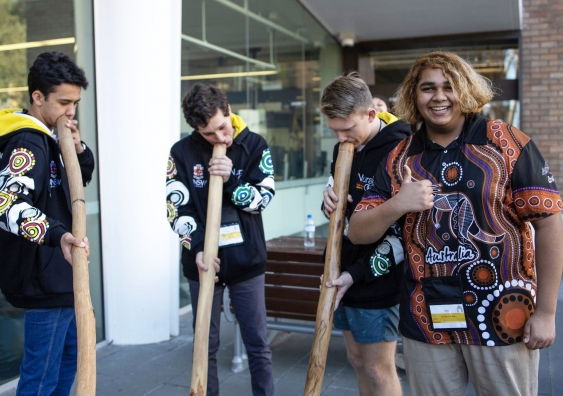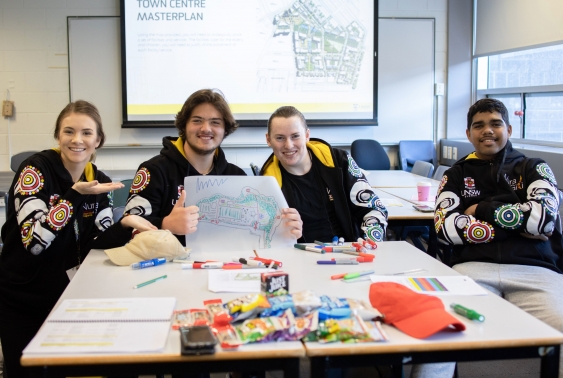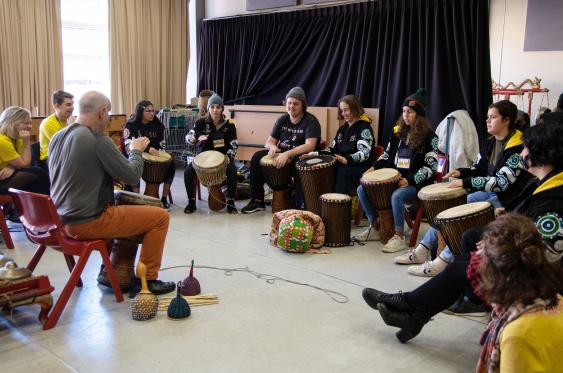Aspiring Indigenous UNSW students plan their futures
UNSW’s Nura Gili Winter School gives Indigenous students from diverse backgrounds a stepping stone into tertiary education.
UNSW’s Nura Gili Winter School gives Indigenous students from diverse backgrounds a stepping stone into tertiary education.

Susi Banks
Media & Content
0412 378 489
Izak Rigney from St Andrew’s Cathedral School in Sydney has known he wanted to study medicine from the age of about 10 when his aunt died of cardiovascular disease. He hopes to become a cardiologist, to help Indigenous people at the Port Macleay Mission, near Adelaide, where he was born.
The school captain, whose great, great grandfather David Unaipon is featured on the Australian $50 note, will this year become the first student at St Andrew’s Gawura Indigenous school to go from kindergarten to Year 12. He credits his love of science being inspired by his great, great granddad, inventor Unaipon.
He said attending the Nura Gili Winter School at UNSW Sydney this month was great because “medicine is one of those very text-booky subjects which involves six years at university, so it’s great to get an idea of what campus life is like, especially outside of study.” He said an additional benefit of the Nura Gili experience is that “it forces you to get creative, to collaborate with others, not just focus on what’s in textbooks.”
Nura Gili Winter School is an opportunity for Indigenous high school students from all over Australia to get a taste of what life is like at UNSW. It is open to students in Years 10-12, who live on campus for a week and are introduced to tertiary studies in an academic area of their choice.
The students get to experience university life with other Indigenous children and are guided and nurtured by a team of professors, students and other UNSW staff. The Winter School program features a range of interactive activities, cultural workshops, lectures and insights into life at UNSW, including a graduation ceremony on the final day where the students don graduation gowns.

The program is open to students in Years 10-12, who live on campus for a week and are introduced to tertiary studies in an academic area of their choice.
The 100 Indigenous students who attended this year’s Winter School ranged from those from remote areas who had never been to Sydney before, to locals who were university-savvy and had attended similar programs at UNSW and other universities. They included several school captains and siblings of current UNSW students and previous Winter School attendees who had encouraged them to apply.
Another school captain, Kirralee Smith, from Kirrawee in Sydney’s north, is planning on studying a dual degree of Aviation and Commerce. Ms Smith was the first Indigenous school captain at her school, Kirrawee High. She praised the connections and friendships made during the week, and mentorship of current UNSW students.
“I always saw uni being in my future and was passionate about aviation and business. UNSW is the only university in Sydney that has an Aviation School, so I knew this was the place for me,” says Ms Smith.
“Also getting to know the lecturers, getting to know the current students that have gone through the program and gotten their degrees. Learning a bit more about yourself; I can’t even describe how much this has benefited me, there are so many different aspects.”
Both Ms Smith and Mr Rigny praised the collaborative aspects and being encouraged to “think outside the box” at Winter School.
“Collaborating in teams is the direction we’re going in,” adds Ms Smith. “There is a huge amount of collaboration going on in the workplace now. Learning how to work in a team means you’re going to be so much better off when you go into that work environment because you’re working with teams pretty much every day.”
Bourgeoning dancer Oseyahn Monck-O’Meara came more than 5000km from Broome in Western Australia to experience studying Arts & Social Sciences at UNSW during Nura Gili Winter School week. The Year 12 student hopes her path will lead to a career as a professional dancer.

Nura Gili Winter School students attending creative workshops.
“I already knew a fair bit about creative arts in terms of dance, creative writing, drama, interviews, but not what was involved in studying and preparing for a career in dramatic arts. It was a real eye-opener coming to UNSW and attending Winter School,” said Ms Monck-O’Meara.
“Being from a remote place you don’t get a lot of opportunities like this. But coming all the way to Sydney to attend has given me a lot more options for my future. And I can go back to my community and spread around what I have learned, so that others can benefit.”
Also passionate about Indigenous Studies and Creative Writing, Ms Monck-O’Meara says it’s her dream to return to Sydney to study at UNSW.
Experience she gained during the week included a workshop with an established hip-hop rapper, which resulted in her group creating music with “noises made by our bodies”; writing “raps about Nura Gili”, and songs and harmonies with a drummer and other musicians.
Speaking about the Winter School, Director of Nura Gili Indigenous Programs Unit, Associate Professor Reuben Bolt said the program helps break down the idea that university is not an option for Indigenous students.
“They experience first-hand the services and programs that Nura Gili has to offer, and they meet our staff face-to-face. They become immersed in the family culture that we espouse and are made to feel welcomed from day one. This is a critical component of the program, particularly given the community narrative that has for so long advocated for universities as institutions for the elite,” says Professor Bolt.
“We are able to change the story for Indigenous students within one week by giving them the personal experience of campus, the discipline-specific knowledge and the friendly and culturally sensitive support they may need.”
More information can be found at Nura Gili Centre for Indigenous Programs and Nura Gili Winter School.